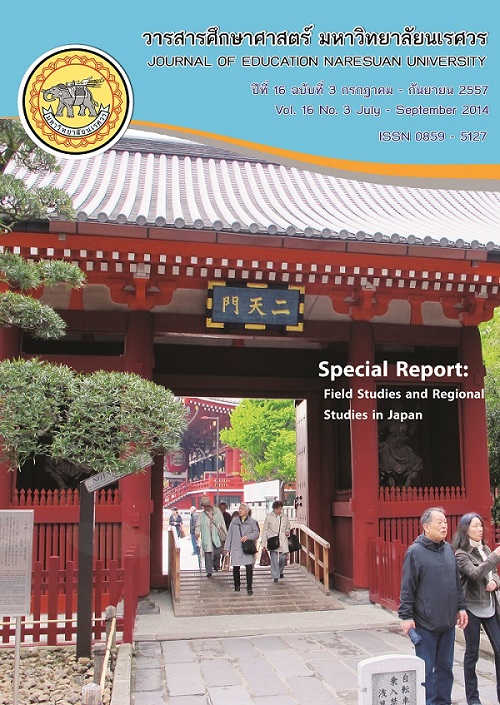การพัฒนารูปแบบประเมินคุณลักษณะอันพึงประสงค์ตามแนวปรัชญาของ เศรษฐกิจพอเพียงของนักเรียนชั้นมัธยมศึกษาตอนต้น
Main Article Content
Abstract
บทคัดย่อ
การวิจัยนี้มีวัตถุประสงค์เพื่อ 1) พัฒนารูปแบบประเมินคุณลักษณะอันพึงประสงค์ตามแนวปรัชญาของเศรษฐกิจพอเพียง ของนักเรียนชั้นมัธยมศึกษาตอนต้นและ2) ประเมินคุณภาพของรูปแบบประเมินคุณลักษณะอันพึงประสงค์ตามแนวปรัชญาของเศรษฐกิจพอเพียงของนักเรียนชั้นมัธยมศึกษาตอนต้น วิธีดำเนินการวิจัยแบ่งออกเป็น 2 ระยะ คือ ระยะที่ 1 การพัฒนารูปแบบประเมินคุณลักษณะอันพึงประสงค์ตามแนวปรัชญาของเศรษฐกิจพอเพียงของนักเรียนชั้นมัธยมศึกษาตอนต้น แบ่งเป็น 2 ตอน ตอนที่ 1 การพัฒนาตัวบ่งชี้คุณลักษณะอันพึงประสงค์ตามแนวปรัชญาของเศรษฐกิจพอเพียง กลุ่มตัวอย่าง จำนวน 14 คน ได้แก่ นักวิชาการศึกษาที่สอนในระดับอุดมศึกษา 2 คน นักวิชาการพัฒนาชุมชน 1 คน ศึกษานิเทศก์ 4 คน ครูที่ขับเคลื่อนปรัชญาของเศรษฐกิจพอเพียงในสถานศึกษา 5 คน และผู้นำชุมชน 2 คนเครื่องมือวิจัย คือ แบบบันทึกผลการสนทนากลุ่ม เก็บรวบรวมข้อมูลโดยใช้เทคนิคการสนทนากลุ่ม วิเคราะห์ข้อมูลโดยการวิเคราะห์เนื้อหา ตอนที่ 2 การพัฒนารูปแบบประเมินคุณลักษณะอันพึงประสงค์กลุ่มตัวอย่าง จำนวน 7 คนได้แก่ ผู้เชี่ยวชาญด้านการวัดและประเมินผล 1 คน นักวิชาการด้านการศึกษา 2 คน ศึกษานิเทศก์ที่ขับเคลื่อนปรัชญาของเศรษฐกิจพอเพียง 2 คน ผู้ที่ขับเคลื่อนปรัชญาของเศรษฐกิจพอเพียงในสถานศึกษาที่เป็นผู้บริหาร 1 คน และครู 1 คนเครื่องมือวิจัย คือ ร่างรูปแบบประเมินคุณลักษณะอันพึงประสงค์ตามแนวปรัชญาของเศรษฐกิจพอเพียง ระยะที่ 2 การประเมินคุณภาพรูปแบบประเมินคุณลักษณะอันพึงประสงค์กลุ่มตัวอย่าง จำนวน 373 คน ได้แก่ ครู 7 คน นักเรียน 182 คน ผู้ปกครอง 182 คน ผู้บริหารโรงเรียนสตรีประเสริฐศิลป์ และโรงเรียนหนองบอนวิทยาคม 2 คน เครื่องมือวิจัย ได้แก่ รูปแบบประเมินคุณลักษณะอันพึงประสงค์ แบบประเมินรูปแบบประเมินคุณลักษณะอันพึงประสงค์ และแบบสัมภาษณ์การวิเคราะห์ข้อมูลใช้ร้อยละ ค่าเฉลี่ย ส่วนเบี่ยงเบนมาตรฐาน การทดสอบค่าที และการวิเคราะห์เนื้อหา
ผลการวิจัย พบว่า 1) รูปแบบประเมินคุณลักษณะอันพึงประสงค์ตามแนวปรัชญาของเศรษฐกิจพอเพียงฯที่พัฒนาขึ้น ประกอบด้วย 5 องค์ประกอบ ได้แก่ (1) เป้าหมายของการประเมิน คือ คุณลักษณะของนักเรียนที่ดำเนินชีวิตโดยใช้หลักปรัชญาของเศรษฐกิจพอเพียง(2) สิ่งที่มุ่งประเมิน คือ คุณลักษณะตามแนวปรัชญาของเศรษฐกิจพอเพียงของนักเรียนชั้นมัธยมศึกษาตอนต้น ตามตัวบ่งชี้ของกระทรวงศึกษาธิการ (3) วิธีการประเมิน ประกอบด้วย แหล่งผู้ให้ข้อมูล ขั้นตอนการประเมิน เครื่องมือที่ใช้ในการประเมิน และการวิเคราะห์ข้อมูล(4) วิธีการตัดสิน ใช้การเปรียบเทียบกับเกณฑ์ และ (5) การรายงานผลการประเมินเป็นรายบุคคล และรายงานผลสรุปเสนอฝ่ายบริหาร และ 2) ผลการประเมินคุณภาพของรูปแบบประเมินคุณลักษณะอันพึงประสงค์ พบว่า มีคุณภาพตามมาตรฐานการประเมิน ทั้ง 4 ด้าน คือ ความถูกต้องครอบคลุม ความเป็นไปได้ ความเหมาะสม และความเป็นประโยชน์ ในระดับมากถึงมากที่สุด
คำสำคัญ:คุณลักษณะอันพึงประสงค์/ ปรัชญาของเศรษฐกิจพอเพียง/ รูปแบบประเมิน/ มัธยมศึกษา
Abstract
The purposes of this study were 1) to develop an evaluation model for assessment of desirable characteristics of lower secondary students based on the sufficiency economy philosophy; and2) to evaluate the quality of the developed evaluation model.
The research process was divided into two phases. The first phase was the development of an evaluation model for assessment of desirable characteristics of lower secondary students based on the sufficiency economy philosophy. It comprised two steps. The first step was the development of indicators for desirable characteristics based on the sufficiency economy philosophy. The research sample consisted of 14 samples, 2 education specialists, 1 community development specialists, 4 supervisors, 5 teachers in charge of mobilizing the sufficiency economy philosophy in schools, and2 community leaders, all of whom took part in a focus group discussion. The research instrument was a focus group discussion recording form. Collected data was from results of the focus group discussion and analyzed by content analysis. The second step was developing an evaluation model for assessment of desirable characteristics. The research sample consisted of seven measurements including 1 evaluation expert, 2 education specialists, 2 supervisors in charge of mobilizing the sufficiency economy philosophy, 1 school administrator and 1 teacher in charge of mobilizing the sufficiency economy philosophy in school. The research instrument was a draft of an evaluation model for assessment of desirable characteristics based on the sufficiency economy philosophy. The second phase was the quality evaluation of the developed evaluation model for assessment of desirable characteristics. There are 373 research samples including 7 teachers, 182 students, 182 parents, and 2 school administrators at Satree Prasertsin School and Nong Bon Wittayakom School. The research instruments were the developed evaluation model for assessment of desirable characteristics of lower secondary students based on the sufficiency economy philosophy, an assessment form for the developed evaluation model, and interview forms. Research data was analyzed using the percentage, mean, standard deviation, t-test, and content analysis.
The research findings showed that 1) the developed evaluation model for assessment of desirable characteristics based on the sufficiency economy philosophy was composed of five components, namely, first, evaluation goal is the desirable characteristics of lower secondary students based on the sufficiency economy philosophy, second, what to be evaluated according to Ministry of education’s indicators, third, evaluation method composed of contributor sources, evaluation tool used to evaluate and data analysis, fourth, judgment method, criteria used, and last, evaluation report, individualized report for each and executive summary; and 2) quality evaluation results of the developed model indicated that it had quality at the high to highest levels in accordance with the four evaluation standards: accuracy and comprehensiveness, feasibility, appropriateness, and usefulness.
Keywords: Desirable characteristics/ Sufficiency economy philosophy/ Evaluation model/ Secondary education
Article Details
The owner of the article does not copy or violate any of its copyright. If any copyright infringement occurs or prosecution, in any case, the Editorial Board is not involved in all the rights to the owner of the article to be performed.


